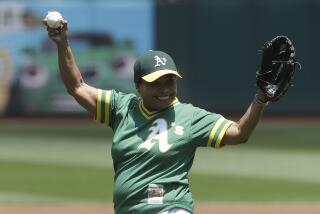A Major League Heist
- Share via
Our nation’s capital was just had. In its quest for major league status, Washington, D.C., has agreed to pay a king’s ransom -- close to half a billion dollars -- to build a baseball stadium in order to lure the game back to town after a 33-year absence. And so, the late-of-Montreal Expos will swing their bats in the shadow of the Capitol next spring, initially at aging RFK Stadium.
Advocates of the deal argue that the cozy new ballpark, proposed for a tired neighborhood on the banks of the Anacostia River, would help spark redevelopment, and we have no reason to doubt that. But a privately financed stadium in the same spot would do the same (with some public investments in surrounding infrastructure, to be sure). And because a new stadium typically causes a dramatic appreciation to a franchise’s value, there is no justification for asking taxpayers -- even if they are K Street lobbyists eager to schmooze at a ballgame -- to foot the bill. Washington officials are quick to note that the stadium would be underwritten by concessions and a tax on businesses, but those tax revenues could easily go toward more pressing public needs.
Taxpayers in the 1990s got taken to the cleaners across the country, as increasingly peripatetic teams cleverly played cities against each other, but the recent trend has been toward privately funded stadiums. This is particularly true for pro football, a business that runs its affairs far more adeptly than Major League Baseball. Given that many communities are vying for the chance to host a National Football League franchise in Southern California, we hope Washington’s foolishness doesn’t signal a reversal of the trend.
What makes the Washington deal -- or heist -- doubly unsavory is that although baseball club owners wouldn’t deign to pay for their own business venue, they did rush to throw money at one of their own, Peter Angelos, the Baltimore Orioles owner. With so many Washingtonians cheering for the Orioles and making the pilgrimage to Camden Yards, Angelos has long been worried about a Washington team’s effect on his market share. The league enjoys antitrust immunity, which is one reason it is essentially able to bribe one of its barons to allow a competitor to play ball. Meanwhile, because D.C. taxpayers would be covering the team’s costs, baseball owners would be able to pocket the money the new local owners pay to acquire the team.
Come to think of it, if members of Congress aren’t too busy in coming years rooting for the new hometown team, they might want to review the wisdom of that antitrust exemption.
More to Read
Go beyond the scoreboard
Get the latest on L.A.'s teams in the daily Sports Report newsletter.
You may occasionally receive promotional content from the Los Angeles Times.










